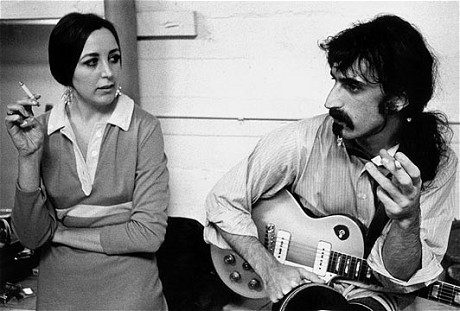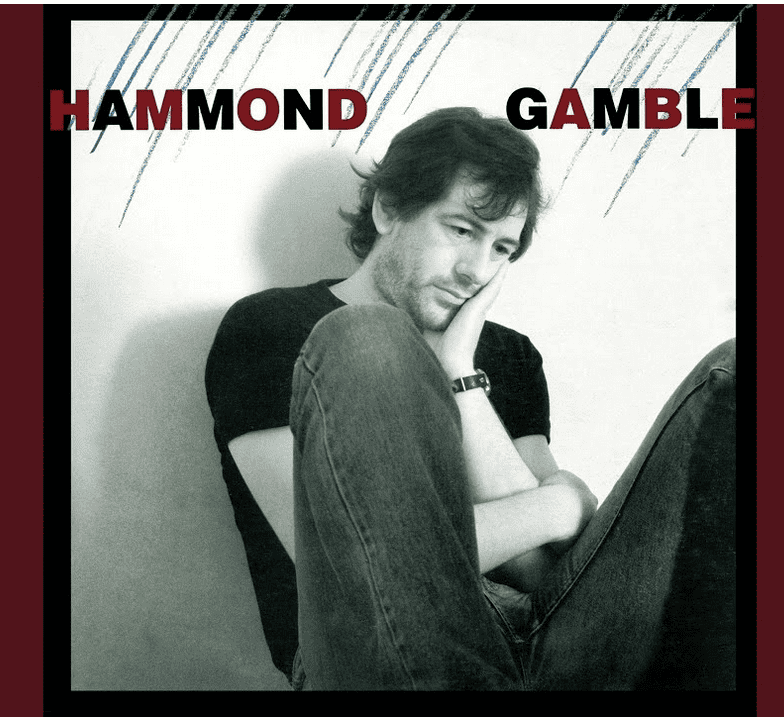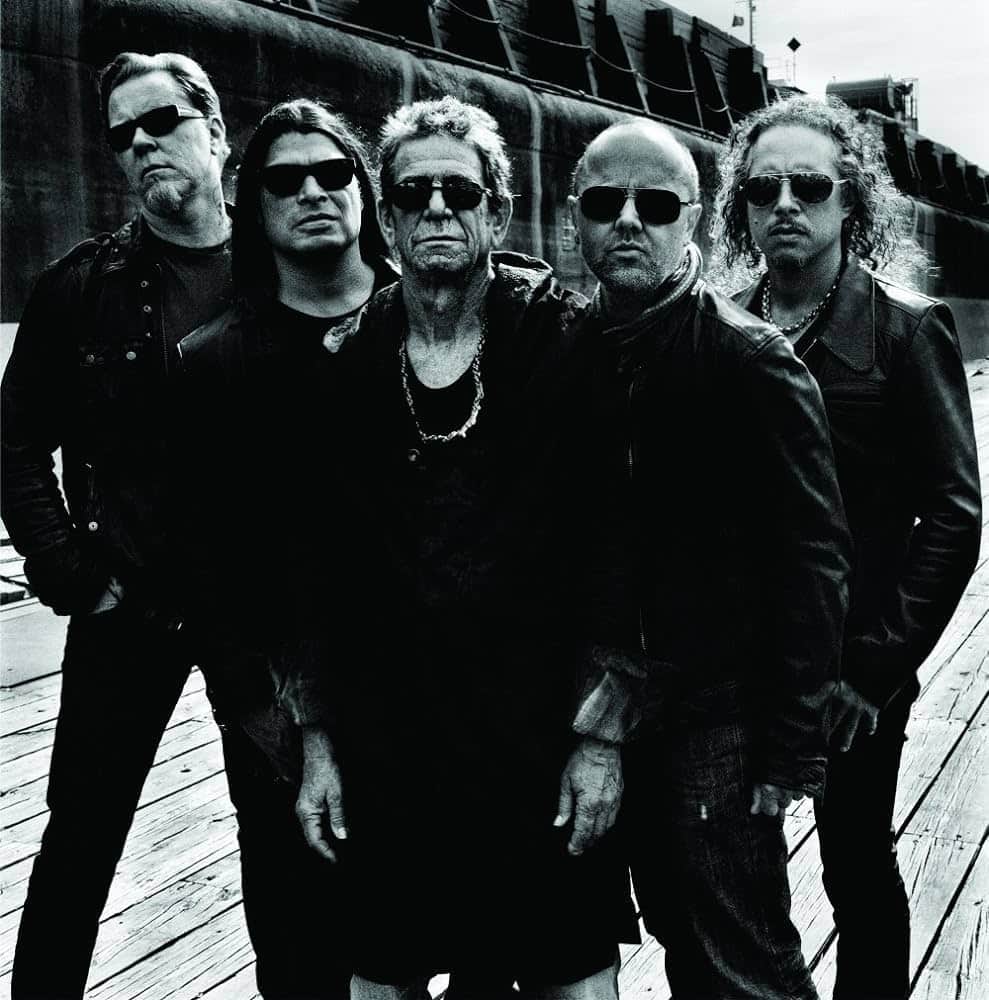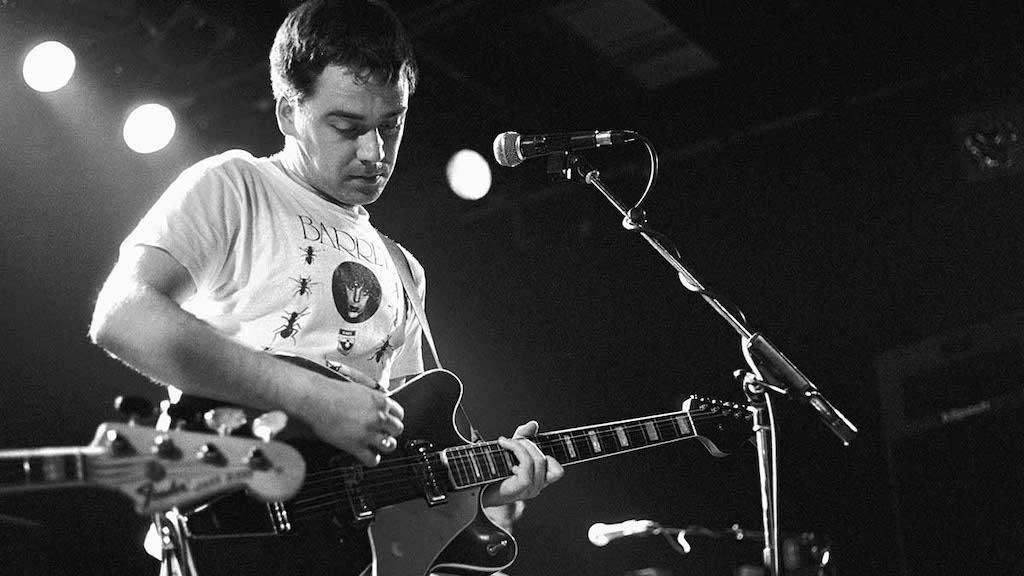PAULINE BUTCHER WAS a for-hire short-term assignment, London-based secretary when she was called to the hotel room of a Mr Zappa in 1967. She was expecting the usual drab businessman. Instead, her client was a musician freak and the job was to copy out the entire libretto to Zappa’s second album with the Mothers Of Invention, Absolutely Free. 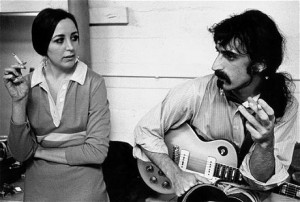
Intrigued by this bizarre-looking but soft-voiced chap, she ended up ensconced in the legendary Zappa “log cabin” in LA, an open house for the “freak” rock community that saw a constant parade of hot rock figures and weirdoes through its doors, including Eric Clapton, Captain Beefheart, Wild Man Fisher, Mick Jagger and Jimi Hendrix. Butcher’s initial job was to help Zappa with a book he’d been commissioned to write, but she ended up being the de facto manager of the groupie band the GTO’s, and being the FZ secretary for around four years.
Pauline Butcher – her married name is Bird – kindly consented to the following epic email interview with questions prompted by my reading of the book, Freak Out! My Life With Frank Zappa. Like her book, it’s perhaps short on the kind of music detail that fans demand, but as she points out, there are loads of books on Zappa’s music, and very few on what he was like as a person. People have happily made judgments on FZ based on their interpretation of his lyrics or interviews or even music, but few have been close enough to the Zappa family to throw the spotlight on the man.
Witchdoctor – What was your main motivation for writing the book, and why now?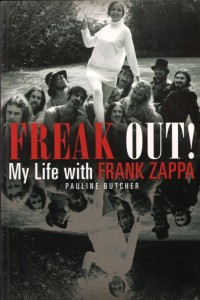
Pauline – I always wanted to be a writer and Frank, more than any other person, encouraged that desire. He saw me writing pages and pages of letters home describing my experiences at the log cabin and although I tried to write about it all then, I just couldn’t do it. As I say in the book, I didn’t know who I was writing for and I was too close to it all. When I left working for Frank and went to Cambridge University, I met my husband, we moved to Scotland where our son was born, and I devoted my time to him and to teaching A-level psychology. Indeed, I never mentioned FZ’s name the whole time I was there.
When I left our son at Oxford University to begin his new life in 2001, I drove home bereft to an empty nest because my husband is always travelling and I had given up teaching by this time. So I had no excuses left. If I wanted to be a writer, I would have to do it now.
I began by writing radio plays for BBC Radio 4 and was advised by a producer that the only way I would break in was to write something that no one else could write and I realised the only thing that no one else could write was my experiences living and working for Frank Zappa.
It began as a fictional play but the producer said to make it fact. She worked with me on several episodes for a serial for Woman’s Hour, but then Germaine Greer was commissioned to do a documentary on FZ for Radio 4 (even though she had met him only once) and they wouldn’t do two programmes on him in one year, so mine was abandoned. It was now 2006 and I had been struggling for five years. To have gotten so close and be rejected again was devastating, but Frank had told me to divert the energy from troublesome situations into a positive force, so I wrote to every publisher in the book saying I was writing about my experiences living and working with Frank and would they be interested. Twelve wrote back and said, yes, so I knew I had a marketable product, but I hadn’t written a word.
I tried adapting the play to prose but it didn’t work, so I reverted to the letters I had written from the log cabin, which my mother and a friend had kept. I slotted in my diary entries and the whole added up to 300,000 words! It took nine months to type them.
By this time, we had moved to Singapore and it was here that I wrote the book, seated by the pool under the arbour, in glorious sunshine, 30C (84F). We have a maid and she supplied me with coffee, tea, lunch, dinner, my clothes washed and ironed, the housework done, while I sat at my computer for ten hours a day longing to get the thing finished.
My agent began sending it out in May 2010 and many publishers turned it down. I despaired until Plexus took an option in October, but it was not until January 2011 that contracts were exchanged. They were worried about libel and about (Frank’s widow) Gail suing but a lawyer found nothing wrong. Finally it was released in September 2011 in England where the media fell all over it. I had full-page spreads in four major newspapers, Express, Guardian, Telegraph and Sunday Times and two radio interviews, one on BBC Radio 4 Today (flagship) program which was picked up by National Public Radio in America, and BBC World Service which was chosen as one of BBC Radio 4’s best of the week. 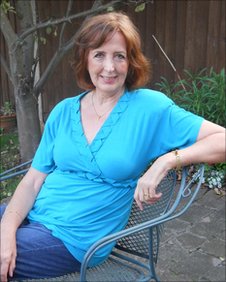
Now it has been released in America and the response from the media there has been zero. I don’t understand it. There are thousands more Zappa fans in US than UK but no one seems to be interested. My publisher assures me they’ve sent the publicity blurb to everyone, so I’m still debating whether to go there. It seems pointless at the moment.
Witchdoctor – Frank’s widow Gail is described less than flatteringly in the book, but by its end (early 1970s) you are fast friends. Is this still the case?
Pauline – I did have a very mixed-up relationship with Gail. I believed we were very good friends, but I believe now that that belief was misguided. Gail wrote to me frequently until 1988 and then the letters stopped. This may be because Frank stopped touring and was at home much more. I don’t know. If I was being uncharitable, I might say that she no longer had to worry about my relationship with Frank as I didn’t see him again after 1988. She is very canny and would know that by keeping me on her side, she was ensuring that nothing untoward would occur between Frank and me – not that there was any chance at all of that happening – but I know that’s how she thinks.
In 2006, I saw Gail in Los Angeles with my husband. We bought her dinner in a restaurant in the valley – she said she never goes to Hollywood. She showed us round their house which I didn’t recognise as the changes are so enormous. I couldn’t work out where the rooms used to be and the basement where Frank used to work was choc-a-block with furniture and the studio beyond altered past my recognition.
When we parted, she hugged me and gave me her email address urging me to write. During the dinner I had chastised her for not answering any of my letters since 1988. She insisted that I had not put the address on the letters. This is false. I am a trained secretary and would never send a letter without a return address on it. So, when I got back to England, I emailed Gail telling her how lovely it was to see her again. I’ve never had a reply. So, as a result, I have not told her about my book and I have no idea what her response is or will be or has been. I would love to know.
Witchdoctor – Some have accused Frank of exploiting the “freaks” he got off the street, as well as those he had on-and-off friendships with, like Captain Beefheart. What’s your take on that?
Pauline – He couldn’t exploit Captain Beefheart. He was his own man and gave back to Frank as good as he got. He was never in awe of Frank. I think, in the end, they accepted each other, differences, warts and all.
The GTOs? I don’t think were exploited either. From my view, Frank liked anything off the wall and these girls were. I think he genuinely wanted other people to know that there was another way they could live – like the GTOs. He gave them a chance to dance on stage with him and the Mothers. He never controlled any of their output at all. We made it all up as we went along. The girls did at least while I cajoled, manipulated and insisted they get it right. I don’t know how far Frank’s attitude would have remained in that vein had the girls become successful. No one knows, but I do think there would have been room for manipulation and exploitation as he was paying them so little ($35 a week each). When would he have begun to increase that sum? One can only speculate. Wild Man Fisher of course got dumped because he was violent and dangerous and Frank, in my opinion, was naive to deal with a man who had tried to kill his own mother.
Witchdoctor – If Gail hadn’t existed, do you think you would have succumbed to Frank’s charms?
Pauline – Yes, I think so. But strangely, he was not particularly sexually attractive to me, but I think his whole charisma and the way we communicated would have got to me, I couldn’t have held off indefinitely; but we would never have suited a long-term relationship. I am sure we would always have been better as friends.
Witchdoctor – What did you really think of Frank’s music?
Pauline – I didn’t come to Frank through his music. I was fascinated by the man. I came to love his instrumentals but I never liked the lyrics except for those early witty ones that made me laugh, but the ‘rude’ lyrics I despise. I was never a music person, I think because of my poor hearing. I was never able to hear the resonances of it, so I was always a ‘speech’ person and listened always to BBC Radio 4 which is a speech based channel and has no music. I think I bought ‘Imagine’ by John Lennon and more recently some of Frank’s albums but I don’t listen to them in order. I do like various tracks. My favourite is ‘Water Melon In Easter Hay’. It is hard to hear that first guitar chord without it bringing a lump to my throat.
Witchdoctor – The routine you describe where Zappa entrenched himself in his work room and wouldn’t be disturbed… is this how he spent most of his time?
Pauline – This routine was how he spent ALL of his time. He never socialised, he never went out, he never saw other groups perform, he never went to the cinema and only watched films at special showings. At the log cabin he worked in his corner by his piano and desk and never stopped except to visit the kitchen and grab something to eat. He did stop when film people from his past came, but stopped less and less when music folk arrived and they came less and less. When he moved to Woodrow Wilson Drive, he rarely left that basement. He would get up, go to it and never leave until he went to bed. He rarely saw sunshine. Workaholic is the word for him. He hated idle chitchat and did not indulge in it. Of course, I don’t know how he was on the road. You’ll have to ask the Mothers.
Witchdoctor – Do you keep in touch with any of the old Zappa-related crowd?
Pauline – I keep in touch with Calvin [Shenkel, album artwork] spasmodically on Facebook. I have been in touch with Sparky [GTO] and Mercy [GTO]. I sent them both a copy of the book and asked them to write reviews. Neither of them has come back with any comment whatsoever. Disappointed about that. I have also sent Pamela Miller [GTO] a copy recently and await to hear from her. [Of the former Mothers] Ian Underwood has deliberately disappeared. Art Tripp is in constant email touch. He is a therapist mid-West somewhere in the States. I communicated with Bunk Gardner who told me Gail had sued him twice and he had backed down both times. He hates her. He wrote her a letter of condolence after Frank died and she wrote back and said for him never to write to her again.
Witchdoctor – You put up with a lot of crap in the book, especially in the log cabin and the appalling lack of dietary requirements. I felt famished after reading those chapters! Why do you think you put up with it? Youth? The excitement of being in a new situation?
Pauline – Yes, I put up with it because I kept hoping it would change. It only came to me slowly that food would not be offered and I put up with it because I should have helped myself and I was so embarrassed at not being able to cook. I didn’t want to show my inadequacy. I could have cooked scrambled eggs and bacon, but I was so shy about it all. It was easier to survive on cheese sandwiches and ice cream. Christine’s cakes helped as well, and then when my friendship with Ian developed, that stopped (when he was in LA) because we ate out every day. And yes, the excitement of it all.
Witchdoctor – One of the things I love about the book is the way you allow a different side of Frank to come through… the guy who is curious about people, soft-voiced, who can be gallant and sweet. Is this the person he really was, or was he, like most people, riven with many irreconcilable contradictions?
Pauline – Of course he was gallant and sweet but like all of us, he was also the opposite. He could be petulant as when he told Ian Underwood, I’ll stuff socks in my mouth. He could be cruel, I think, as he was to Gail with the women he brought to the house (but this was after my time). He was super intelligent, but capable of peculiar misconceptions (refusing to believe that an ingredient in tobacco could give him cancer). His laugh was infectious and it was always a delight when I could make him laugh, which I did often (but annoyingly I didn’t write down what I said or did that had that effect and I can’t remember, but I know I could make him laugh quite a lot.) On the other hand, he was moody as well, and everyone knew to keep out of the way when he did not want to be disturbed. He never ever raised his voice, but would show his displeasure by a disdainful glance your way and a return to the music sheets he was writing on.
Witchdoctor – I also loved the way you discussed the early days of the feminist movement. Frank’s often been accused of being an old-fashioned machismo philanderer, and yet Germaine Greer, one of the most famous feminists, was a fan and friend. But then there’s the song where Frank sings “Women’s liberation/came creeping all across the nation” (‘Bobby Brown’). Do you think he ever grasped any of the tenets of feminism?
Pauline – Germaine Greer was certainly a fan, but I wouldn’t call her a friend – she met Frank once and stayed in touch with Gail for a short while afterwards, but that’s it. Frank was not into feminism and I’m not sure if Germaine grasped that. Frank had a very old-fashioned attitude toward Gail (not allowing her to look at another man although I believe this changed toward the end of their relationship), and also toward me, strangely. When, toward the end of my time working for Frank (when I was also doing the work for Ronan O’Rahilly collecting videos of rock stars to send to England for Ronan’s 24-hour TV station to be beamed from an aeroplane) they were slow in paying my fees and I considered working for a dance place in LA where men paid so much money a minute to dance with girls. Frank was totally opposed to my doing this and loaned me money to tie me over. It was a strange paradox that he, above any other man I had met before or since (except my husband) believed I was capable of things beyond being a secretary, but perhaps he considered the arts okay and also in business (they had girls in executive positions in Bizarre and Straight) but he certainly seemed to condemn women who wanted to take up jobs in the establishment. He seemed to believe that strong women would result in weak men, (‘Bobby Brown’). It seems a stretch to assume they would turn into homosexuals but no one seems to have questioned Frank about this.
Witchdoctor – One of the most touching moments in the book (in a funny way) was the way you described Frank’s dedicated musical notation… carefully writing his ‘dots on paper’ music. Did he literally sit down for hours scrawling out music on paper without being able to hear it?
Pauline – Scrawling is the wrong word to use here. He used a ruler and was meticulous in every note he put down. The uprights are perfectly upright drawn with a ruler, the notes themselves are perfectly shaped. He was not writing most of the time. Much of the time was spent on the piano or on the guitar. When he discovered a passage he liked, then he wrote it down. Other times, yes, as he said, he wrote what he imagined it would sound like but was not sure until he heard it played. I believe this related to his orchestral classical stuff, not to his band compositions, but I am not 100% sure about this. I imagine it was a bit of both.
Witchdoctor – You talk quite a bit about the weird hours Frank kept, and the lack of nutritious food in the house. I would have thought that the wholefood/organic movement would have been gaining pace around this time. Was no one in Frank’s circle interested in healthy eating? Why do you think Frank was so averse to it? To me, it’s one of the great contradictions in a chap who in many ways seems guided by logic and science, that he didn’t see the value of good nutrition. And what about Gail – couldn’t she have organised better food in the house?
Pauline – You are right, Frank’s attitude toward food is one of his great contradictions, food and tobacco. In one of his last interviews when he knew he was dying, he was still smoking and the interviewer noted it, ‘I can’t help noticing that you have cancer and you are still smoking.’ Frank replied that tobacco was a vegetable and as a result (he implied) not harmful. Gail could not organise healthy food in the house I believe because Frank wasn’t interested in food. In my book I describe the first time that Frank was on tour for two weeks. Gail cooked every night. This is a strange revelation. Kansas (our minder) was the man in the house, employed to look after us, and he praised and enjoyed everything she cooked. We sat in the kitchen every night together and had a real ‘family’ time. There was no mention of macrobiotic food. We had pasta, salads, and whatever I describe. When Frank returned, Gail no longer cooked. Frank did not like communal meals in the house. He always ate alone, so why should Gail cook to sit in the kitchen by herself? She had no incentive to cook for the rest of us and we were expected to help ourselves. The trouble was no one cleared up after themselves. There were a few specialist bookshops that sold incense and stuff like that, that sold books on macrobiotic foods, but that kind of cuisine had not hit the mainstream at all, and as I’ve just described, food was not an important focus in Frank and Gail’s life.
I might qualify a little more on the ‘Bobby Brown’ thing. It could be that he’s commenting on the fact that ‘strong’ women tend to attract gay men, and that this is what the song is about, not that ‘strong’ women turn men gay. I cannot believe Frank would be so crass. Think Madonna and Lady Gaga. Frank would have had a field day with her I think. If Frank had lived and had met women like Condoleezza Rice in the political world I think he would have been impressed. He always gave credit where credit was due.
Witchdoctor – Why do you think Gail is so litigious and unhappy about anyone other than the family celebrating FZ or his music?
Pauline – I think she’s very misguided, and thinks only [his son] Dweezil can get it right. When you think how Frank himself crucified so much of other people’s work, it’s a downright outrage on her part. She still professes, publicly at least, that Frank was the finest this that and the other, but strangely, when we had dinner with her five years ago, she never mentioned him except to say that he wanted her to move out to Malibu and leave the music scene behind. She tried it but was lonely, so came back to their home. Being Frank’s gatekeeper gives her status and a reason for life.
Witchdoctor – What are your fondest memories of Frank, and of those times? And least fondest?
Pauline – First, when I sat opposite him in the restaurant in New York and he said, ‘I have a better idea. Why don’t you come out to California and type the transcript there.’ It was a Eureka moment for me, a chance to break out of my monotonous life in England and step into an exciting world. I could have hugged him, but of course I held back because at that moment, I wasn’t 100 percent sure that he really meant it or if it was possible (given my visa situation).
Second, when he hugged me in the kitchen at the log cabin. He’d been away for two weeks and returned the day before. He pulled me into his arms in such a tender way and held me close so affectionately that I felt he had missed seeing me and was very fond of me. That kept me going for several weeks!
Third, in the hospital in London. It was two weeks after he’d been knocked off the stage at the Rainbow Theatre and had suffered concussion, a broken leg and damaged arm but by that time, he was on the road to recovery. I sat by the bed and he held my hand as if he didn’t want to let it go. I wrote in my diary: ‘His affection I can feel. Our rapport has the same feeling to it as when we first met.’
Now, the least fond memory. This is easier. The abrupt way he informed me that I would no longer be living in his house when they moved out of the log cabin. I describe this scene in the book. I was a stranger in Hollywood, had no means of transport, very little money, and suddenly, without warning, I was told I would no longer be living with them. It was quite harsh. He made the statement and then disappeared back to his desk giving no opportunity for questions.
Secondly, I was very un-fond of his lyrics in many songs, which showed derision toward women. He defended himself by maintaining he was a ‘reporter’ and this is what he saw, but why call the song ‘Crew Slut’? I’m sure he was derogatory toward groupies generally because when his sister told him about her love life and he asked her, ‘you’re not one of these girls that rolls on the floor with guys’ and she replied, ‘yes’, he apparently groaned. He had the same protective attitude toward me when I was going to work at danceland, and in order to prevent that happening, he loaned me $300.
Finally, in answer to some of the criticisms in your review of the book, it’s true that I did miss lots of conversation, including Frank’s, when there was more than a few people in the room and that, of course, was due to my poor hearing. It has always been a handicap for me. How much more I could have discerned, for example, about Eric Clapton’s take on Frank, and others, if I could have heard their throwaway lines. It would have made it much more round, I agree. It makes me think that I should have written something about that, about how frustrating it was for me not to hear everything that was said. I’m just grateful though that there was enough other detail from my letters about other aspects to save the book. I’m glad you’ve warned people that there’s no analysis of the music but I don’t mind that omission since there are endless other books on that topic. I do mind that there’s not enough analysis and interest in the rock stars though. That disappoints me, too!

